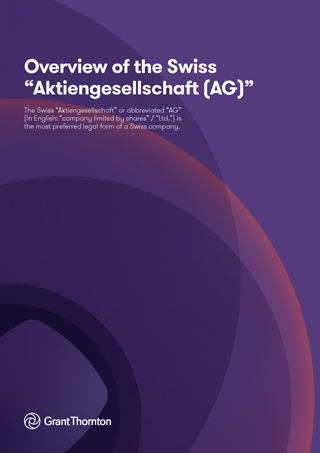
In contrast to the Swiss “Gesellschaft mit beschränkter Haftung (GmbH)” which can be established with a capital of CHF 20’000, the shareholders of an AG may remain anonymous and are not registered in the commercial register since the AG is not as person-oriented as the “GmbH” and the shareholders do not automatically have the right to manage and represent the company.
The AG can be defined as a company with its own capital which is divided into shares and whose liabilities are payable only from the company assets. The shareholders may not be required, even under the articles of association, to contribute more than the amount fixed for subscription of a share on issue. They are not personally liable for the company’s obligations. The relevant provisions can be found in art. 620 – 763 of the Swiss Code of Obligations.
The main features of the AG are summarised as follows:
At least one founder is required. Founders can be Swiss citizens or foreigners being either individuals or legal entities.
The registered capital is divided into shares and must amount to at least CHF 100’000 of which 20%, but at least CHF 50’000 must be paid in. This can be in cash or with a contribution in kind.
- Liability is limited to the share capital.
- The establishment of an AG demands a formal, notarial incorporation process. The AG acquires its legal personality upon its registration in the commercial register.
- The corporate bodies of the AG are: general meeting as the supreme governing body, the board of directors as the executive body and the auditors, if any, as the accounts-controlling body.
- Participation of the shareholders in the AG is not required. Their mandatory contribution is limited to the payment of the share capital.
- Unless otherwise stated in the articles of association or the organisational regulations, each member of the board of directors has power of representation. The board of directors can delegate the representation to individual board members or to third parties. At least one member of the board of directors must have the right of representation. Furthermore, the AG must be represented by at least one person who is domiciled in Switzerland.
- In general, there is free choice of the company name. However, the term “AG” has to be added to the company name.
- An AG must keep company accounts. There needs to be double entry bookkeeping with a balance sheet, an operating or profit and loss account and an inventory.
- An ordinary audit is required for a public company (particularly when listed on the Stock Exchange) and for a company that exceeds two of the following thresholds in two successive financial years: total assets of CHF 20 million, sales of CHF 40 million, and an average of 250 full-time employees over the year.
- Small and medium sized companies which do not exceed the aforementioned thresholds are subject to a limited audit (review). Such small and medium sized companies with less than 10 full-time employees over a year have the right to waive the limited audit (review) entirely if all shareholders agree.


